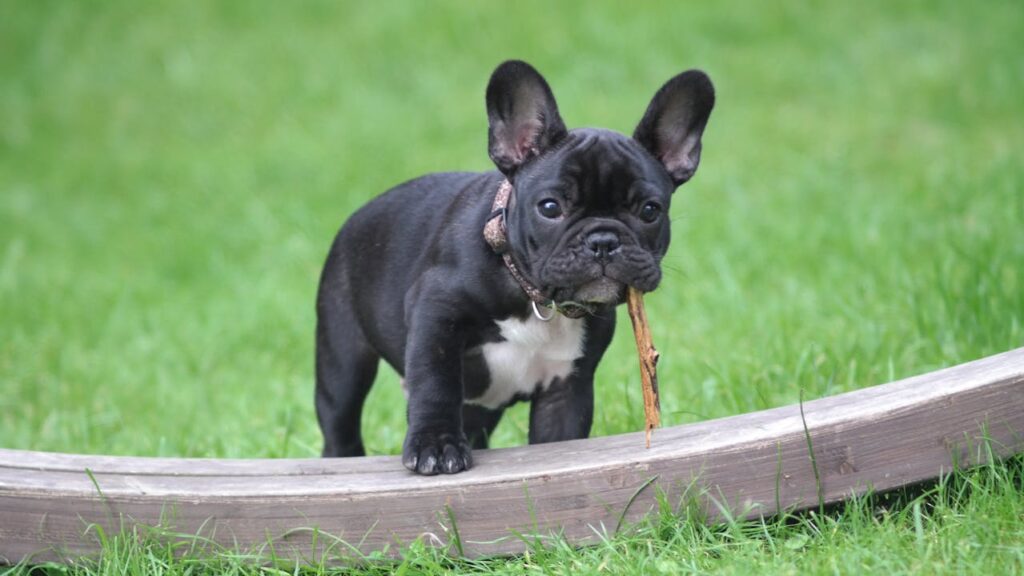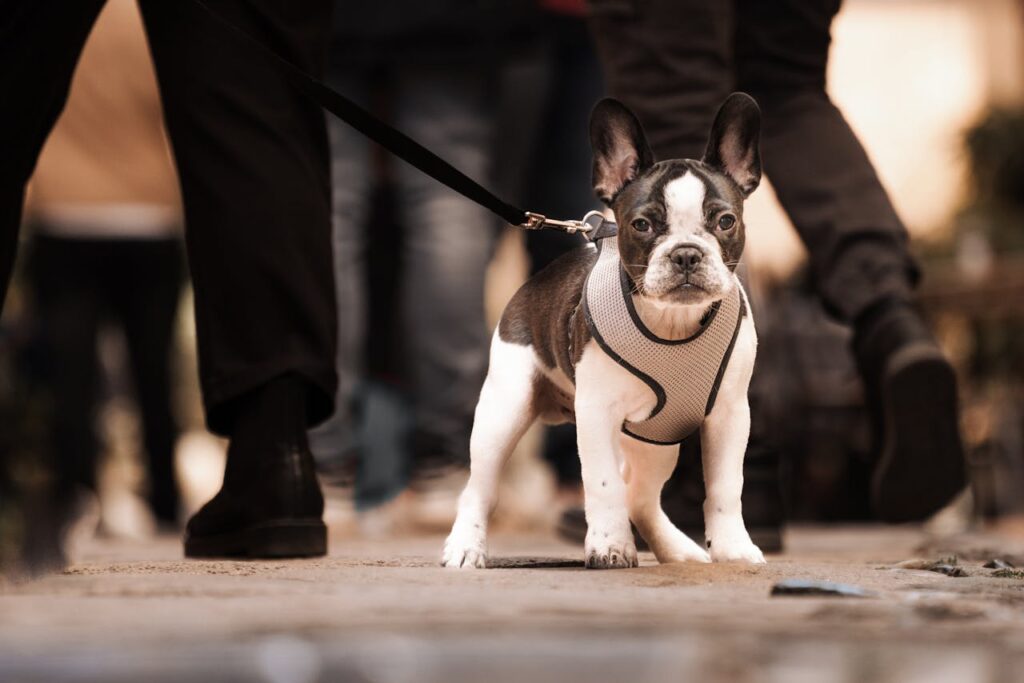French Bulldogs, commonly referred to as Frenchies, are a breed cherished worldwide for their unique appearance and affectionate nature. Small yet sturdy, these dogs are known for their playful personalities, bat-like ears, and endearing charm.
In this article, we’ll explore everything there is to know about French Bulldogs, providing a detailed guide for potential owners and enthusiasts alike.
Table of Contents

Introduction to French Bulldogs
The French Bulldog is a small, companionable breed that has won the hearts of dog lovers across the globe. Known for their adaptability, French Bulldogs thrive in a variety of living environments, making them perfect for both city dwellers and those with smaller homes.
With their gentle demeanor and sociable nature, French Bulldogs have become one of the most popular dog breeds in the world.
History and Origin of French Bulldogs
The French Bulldog’s history can be traced back to 19th-century England, where smaller versions of English Bulldogs were bred to serve as companion animals for lace workers. When these workers migrated to France during the Industrial Revolution, they brought their small Bulldogs along.
Over time, the breed developed unique characteristics in France, including their iconic bat-like ears. French Bulldogs quickly gained popularity among the French elite and eventually became a globally recognized breed.
Why French Bulldogs Were Created
French Bulldogs were originally bred for companionship rather than work. Unlike many breeds developed for hunting, guarding, or herding, French Bulldogs were designed to be affectionate, loyal, and low-maintenance pets.
Their size and temperament made them ideal for city living, and their friendly nature has made them cherished companions ever since.

Physical Characteristics of French Bulldogs
French Bulldogs are instantly recognizable due to their compact size, muscular build, and unique facial features. They typically weigh between 16-28 pounds and stand about 11-12 inches tall at the shoulder.
Their short, smooth coat comes in a variety of colors, including brindle, fawn, white, and pied. One of the most striking features of the French Bulldog is their large, erect ears, often described as bat-like, which add to their distinctive look.
Their flat, wrinkled faces and short noses give them an adorable, expressive appearance.
Temperament and Personality of French Bulldogs
The French Bulldog is known for its affectionate and friendly nature. They are incredibly loyal to their owners and thrive on human interaction.
French Bulldogs are social animals, enjoying the company of families, children, and even other pets. Their playful and curious personality makes them excellent companions for individuals of all ages.
Despite their small size, they have a confident demeanor and love to be the center of attention. However, they can also be stubborn, which requires patience and consistent training.
Health Concerns and Lifespan of French Bulldogs
Like many purebred dogs, French Bulldogs are prone to certain health issues. Their flat faces can lead to brachycephalic airway syndrome, which can cause breathing difficulties.
They are also susceptible to skin allergies, ear infections, and joint problems such as hip dysplasia. Regular vet check-ups, a balanced diet, and a healthy lifestyle can help mitigate these issues. On average, French Bulldogs have a lifespan of 10-14 years, but with proper care, many live longer.

Diet and Nutrition for French Bulldogs
Proper nutrition is crucial for maintaining the health and well-being of French Bulldogs. A diet rich in high-quality protein, healthy fats, and essential vitamins is recommended. Portion control is important, as French Bulldogs can be prone to obesity.
Owners should avoid feeding them table scraps or foods that are toxic to dogs, such as chocolate, grapes, and onions. Consulting a veterinarian for a tailored diet plan is always a good idea.
Exercise and Energy Levels of French Bulldogs
French Bulldogs are not overly active, but they still require regular exercise to stay healthy and prevent obesity. Short daily walks and interactive play sessions are usually sufficient to meet their energy needs.
Due to their brachycephalic nature, they should not be overexerted, especially in hot weather, as they are prone to overheating. French Bulldogs enjoy games that challenge their minds as well as their bodies, making puzzle toys an excellent choice.
Grooming and Maintenance for French Bulldogs
French Bulldogs are relatively low-maintenance when it comes to grooming. Their short coat requires weekly brushing to remove loose hair and keep their skin healthy. Regular cleaning of their facial folds is essential to prevent infections.
Owners should also trim their nails monthly and clean their ears regularly to avoid buildup and irritation. Bathing should be done as needed, typically once every few months or when they get dirty.
Training and Socialization of French Bulldogs
French Bulldogs are intelligent and eager to please but can also be stubborn at times. Consistent, positive reinforcement training methods work best with this breed.
Early socialization is crucial to ensure they grow up to be well-behaved and confident adults. Introducing them to a variety of people, pets, and environments during puppyhood helps reduce anxiety and behavioral issues later in life.

Choosing the Right French Bulldog Puppy
When selecting a French Bulldog puppy, it’s important to choose a reputable breeder who prioritizes the health and well-being of their dogs.
Look for breeders who provide health certifications and allow you to meet the puppy’s parents. Observe the puppy’s behavior to ensure they are social, curious, and healthy. Avoid purchasing from puppy mills or unverified sources.
For a detailed guide on how to make this important choice, check out our article “Guide to Choosing Your Dream Puppy” It covers everything from identifying reputable breeders to understanding how to match a puppy’s temperament with your lifestyle.
By following these tips, you can ensure you bring home a healthy and happy French Bulldog that’s perfect for your family.
Fun Facts About French Bulldogs
- French Bulldogs cannot swim due to their body structure, so caution should be taken around water.
- They are one of the most popular dog breeds in the United States and Europe.
- French Bulldogs are known for their unique snoring sounds, a result of their brachycephalic anatomy.
- They have a surprisingly strong bond with their owners, often acting as shadow companions.

Challenges of Owning a French Bulldog
While French Bulldogs are delightful pets, they come with certain challenges. Their health issues can result in higher veterinary costs, and their sensitivity to extreme temperatures requires careful attention.
Additionally, their stubborn nature can make training a bit challenging, requiring patience and consistency from their owners.
French Bulldog Puppies: What to Expect
French Bulldog puppies are bundles of energy and curiosity. They require careful attention, early training, and socialization to ensure they grow into well-mannered adults. Their playful antics and adorable appearance make them irresistible, but potential owners should be prepared for the responsibility that comes with raising a puppy.
Breeding and Reproduction in French Bulldogs
Due to their unique anatomy, French Bulldogs often require assistance during breeding and birthing. Most French Bulldogs are delivered via cesarean section, making breeding a complex and costly process. Responsible breeding practices are essential to ensure the health and well-being of both the mother and puppies.

Final Thoughts on French Bulldogs
French Bulldogs are a charming and lovable breed that brings joy to countless households. Their affectionate nature, unique appearance, and adaptable personality make them a popular choice for pet owners.
However, owning a French Bulldog requires commitment, as they come with specific care needs and potential health challenges. With proper attention and care, French Bulldogs can live long, happy lives and become treasured members of any family.

Discover More About Dogs
If you enjoyed learning about French Bulldogs, you might also love our detailed guide on Labrador Retrievers. Labradors are another incredibly popular breed, known for their intelligence, friendly demeanor, and versatility. Check out the article to discover why Labradors are often considered one of the best family pets and working dogs!
FAQs
What are the key characteristics of French Bulldogs?
French Bulldogs are known for their affectionate, playful, and adaptable nature. They are small, muscular dogs with a distinctive “bat ear” appearance and make excellent companions for families and individuals alike.
How much exercise does a French Bulldog need?
French Bulldogs require moderate exercise, such as short walks and indoor play sessions. Due to their brachycephalic (flat-faced) nature, they should avoid intense physical activity, especially in hot weather.
Are French Bulldogs good with children and other pets?
Yes, French Bulldogs are friendly and sociable dogs that get along well with children and other pets. Their gentle and affectionate demeanor makes them a great choice for families.
What are common health issues in French Bulldogs?
French Bulldogs are prone to health concerns such as breathing difficulties, hip dysplasia, allergies, and skin conditions. Regular vet check-ups and proper care can help manage these issues.
How should French Bulldogs be groomed?
French Bulldogs have a short, smooth coat that requires minimal grooming. Regular brushing, ear cleaning, and wrinkle care are important to prevent infections and maintain their overall hygiene.





2 Comments
Pingback: German Shepherd, Everything You Need to Know About This Amazing Breed - Pet Bonded
Pingback: Rottweilers: The Perfect Blend of Strength and Loyalty - Pet Bonded